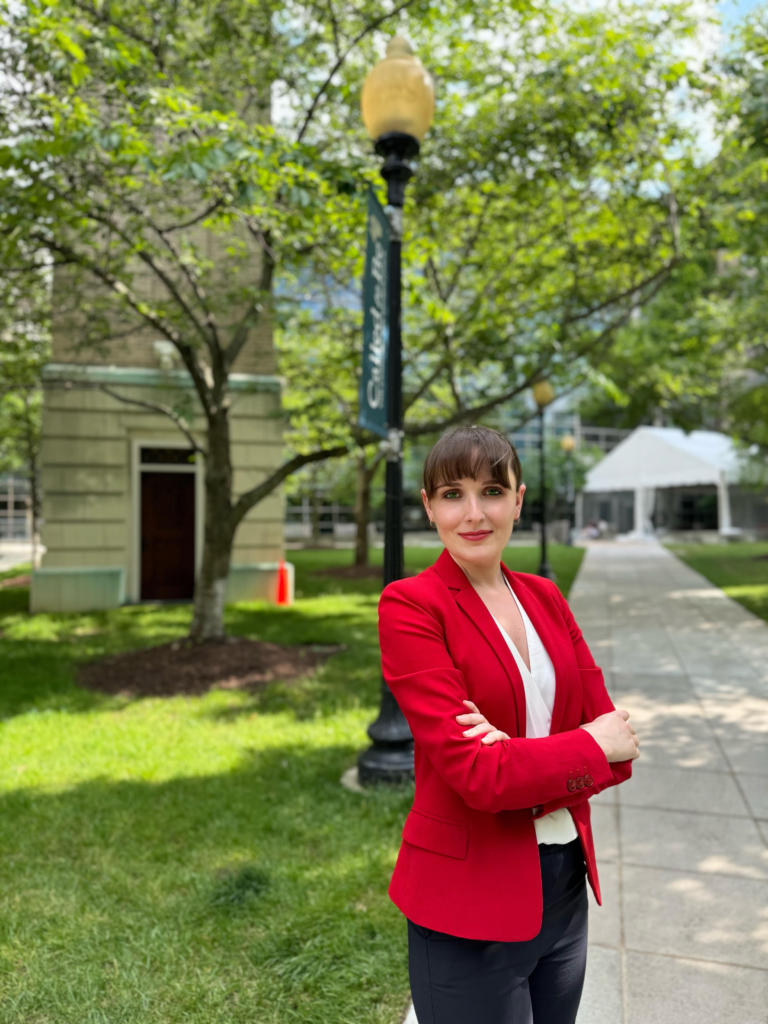Posted by Stephen Horowitz, Lecturer of Legal English

Sheika Al Kamyani is from Oman and is currently in her second year of the Two-Year LL.M. Program at Georgetown Law, specializing in International Business & Economic Law. This fall, she secured an externship with Foley Hoag LLP. Over the summer, she interned at Three Crowns LLP in London. Sheika previously worked as a Legal Advisor at the Foreign Ministry of Oman and holds an LL.B. from Sultan Qaboos University. Her hometown, Nizwa, is known for its rich history.
As I reflect on my first year in Georgetown Law’s Two-Year LL.M. program, I am reminded of the transformative journey it has been. From the moment I arrived, filled with hope and uncertainty, to where I stand now, confident in my direction, the growth has been both profound and unexpected. For those who may be feeling uncertain or lost in their journey, I hope my reflections will offer some helpful insights.
Pursuing an LL.M. in the United States was a hard-fought dream. Yet, even after achieving this milestone, I found myself questioning: What comes next? What is the real purpose of this degree, and what do I truly want to do with my life? Does this sound familiar? At some stage, we all ask the same questions. Below are a few key strategies that guided me toward a clearer sense of purpose—strategies that may also serve you.
- Be Curious: Explore Events and Connect with People
Curiosity, I learned, is one of the most valuable tools during your time at Georgetown Law. With such a vibrant and diverse international community, the law center offers a wealth of perspectives, experiences, and opportunities to explore. Every day offers a new event—whether academic discussions, professional networking, or community engagement. I highly recommend that you attend some of these events and immerse yourself in areas you might not have initially considered. By broadening your horizons, you open doors to unexpected interests and valuable connections.
To put this into action, make it a habit to scan the weekly emails sent by Georgetown Law outlining upcoming events. Choose those that resonate with you, mark them in your calendar, and attend them. Some events may require advanced registration, so stay organized!
Reflecting on this, as an introvert, these events took a great deal of my energy, and I needed to prioritize the ones I chose to attend. But, in the end, it was worth it. I gained clarity on what I wanted to do, and I learned about the different areas of law practice.
- Try Different Things: Experiment and Learn
If you’re unsure about your interests, the best way to figure them out is by trying different things. Take diverse courses, participate in externships, and engage in extracurricular activities like moot court competitions. Through this process, you’ll discover what excites you and what doesn’t. It’s easy to think you know what you like, but only by immersing yourself in new experiences will you truly understand your passions. In the end, you have your unique interests, and you can discover what they are by trying new things.
- Do not wait until the last minute: Think ahead and make a plan
If you feel lost, rather than giving into your anxiety, think ahead. For example, you might already know that you want to apply for an externship. Figure out the steps you need to take. You could start by preparing your resume. Get it reviewed, revised, and polished so that you’re ready when opportunities arise.
When it comes to applications, there are two strategies. One approach is to apply widely—submit as many applications as possible and hope to secure a few offers. The other approach, which I used, is more focused. I targeted specific opportunities that aligned with my goals. This method worked for me and helped me land a meaningful summer internship. Both approaches have their merits, and you should choose the one that best suits your style.
- Seek Guidance: Don’t Hesitate to Ask
One of the most valuable lessons I’ve learned is that it’s okay to ask for help. Whether from professors, teaching assistants, or peers, never hesitate to seek guidance. Initially, I was reluctant to ask questions, but every time I did, I was glad I had. People are often more than willing to assist, and each conversation I had led me to new insights or opportunities. Sometimes, a simple conversation can provide clarity or direct you toward resources you didn’t know existed. Don’t be shy about reaching out.
- Be Patient: Growth Takes Time
Lastly, give yourself permission to grow at your own pace. You don’t need to have everything figured out immediately. The LL.M. program is a time of exploration, so don’t rush through it. Enjoy the process, and be kind to yourself during moments of uncertainty or challenge. Personal and professional growth is gradual, and every experience—whether a success or a setback—contributes to your long-term development.
Final Thoughts
The path to self-discovery during my first year at Georgetown Law wasn’t linear, but it was incredibly rewarding. By staying curious, trying new things, planning ahead, and seeking guidance, I gained a clearer sense of purpose and direction. I hope these reflections will help you as you navigate your own path, wherever it may lead!






